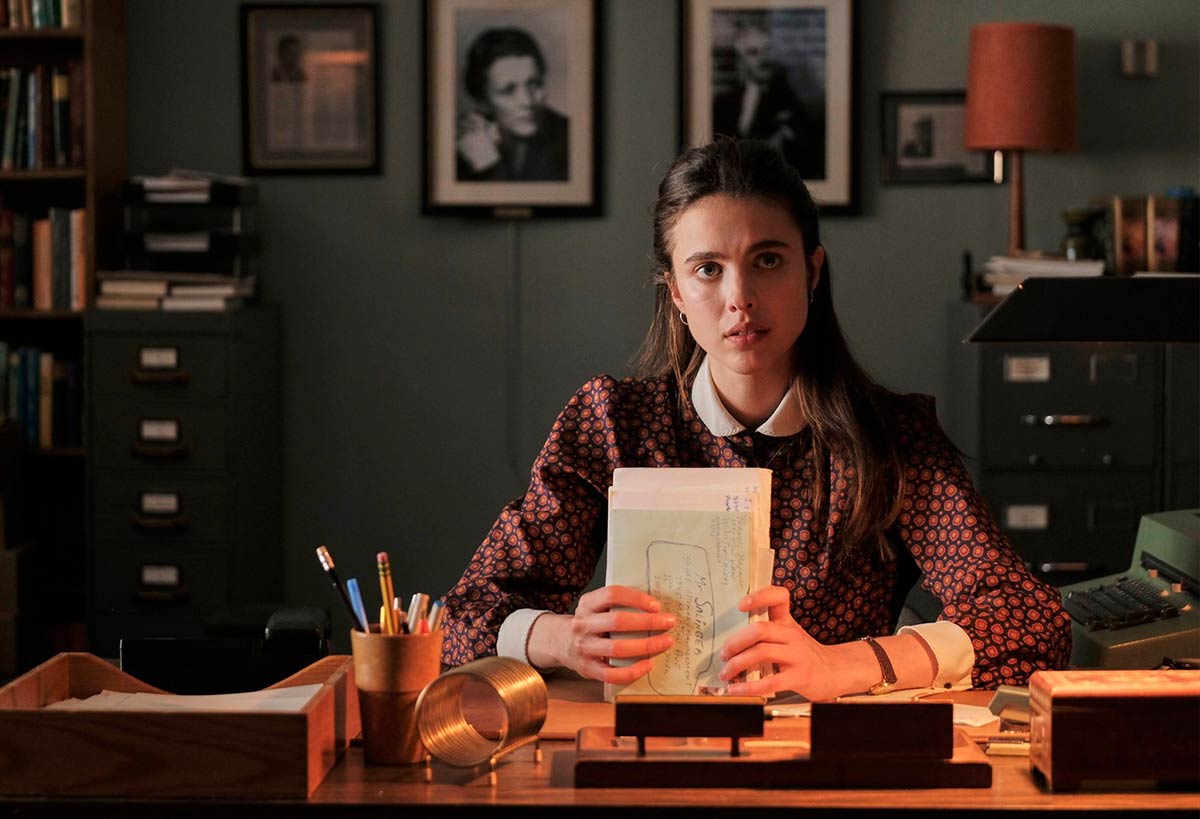All creatives, at one point or another, have been confronted with a particularly frustrating nuisance: The need to survive. The unique frustration spurred from this is predominantly born, of course, out of the fact that the creative passions—poetry, storytelling, filmmaking—seem almost impossible to monetize until one makes it to the glittering heights stardom and success. The old cliché of “write what you know” clearly rings true to filmmakers, given the abundance of films that rely on this particular brand of metanarrative. Philippe Falardeau utilizes a relatively unique approach to this manifestly common theme with “My Salinger Year“—a twee, veering-on-saccharine, happily elegant little thing—by bringing the conflict of aspiration against survival to the front and center, rather than relegating it to the background.
READ MORE: 12 Most Anticipated Films Of The 2020 Berlin International Film Festival
What actually defines a writer, the film (literally, at one point) asks: To write and go nowhere or to be published (and, in doing so, contribute to the devilish machinations of capitalism)? The answer feels incredibly similar to “The Devil Wears Prada,” albeit set within the dustier walls of a literary agency rather than a glamourous bespoke fashion house.
Our protagonist is Joanna (Margaret Qualley), a recent graduate from California with dreams of becoming a published author—her preferred medium is poetry. The writer’s portfolio, at the time of the film’s opening, is comprised of two poems in the Paris Review and a Master’s degree from University College London. She’s offered a job at an esteemed New York literary agency, headed by the formidable, chain-smoking, Cruella Deville-esque Margaret (Sigourney Weaver). Their clientele reads like a ‘Best Of’ list of American authors from the last century: Agatha Christie, F. Scott Fitzgerald, Langston Hughes, and of course, “The Catcher in the Rye” author J. D. Salinger.
Joanna drops everything in her home state, including her boyfriend (whom she unceremoniously ghosts, in one of the film’s confusing narrative pathways) to forge a literary career in New York. She becomes the personal assistant to Salinger—known simply as Jerry to all within the agency—and, as a result, filters his fan mail; to which Salinger, a notorious recluse, has declined to respond for the past three decades. Joanna’s heart is sympathetic to the fans, all of whom—from the manic depressives to the Vietnam war veterans, who universally express a unique emotional attachment to the protagonist of ‘Catcher’—receive a “bullshit” general response. Margaret advocates for a more pragmatic approach, telling Joanna that her job is to “use judgment, not empathy.”
This is particularly illustrative of one of “My Salinger Year’s” key tensions: That between impersonal pragmatism and emotional engagement. This bleeds into the conversation the film has, too, on financial security within a less desirable job against the pursuit of creative impulses. While the role of Don, Joanna’s New York boyfriend, doesn’t give much for Douglas Booth to actually do—aside from bathing in faux-woke, neo-socialist clichés—it does, here, play a significant part. He argues that simply to write makes one a writer—that creation is more important than for the results to be seen—and that publishing “is commerce.” This juxtaposes nicely against Joanna’s increasing creative pressures, but as with many of the film’s loftier ideas, it’s very surface level.
READ MORE: The 25 Best Movies Of 2020 We’ve Already Seen
“My Salinger Year” does consistently bring interesting ideas to the floor, but it’s a great shame that these are never truly picked apart. The abundance of literary clichés on which the film relies is consistently its biggest obstacle to overcome. The film is a fun watch, and Weaver and Qualley enjoy some relatively strong chemistry (although this is clearly not a relationship that will reach the iconic status of ‘Prada’s’ Hathaway-Mirren connection), but the characters are all frustratingly cookie-cutter, which gives the audience little to chew on.
You might argue that this works partially to the film’s benefit, given that it manifestly leans into mainstream simplicity—rapidly paced with an engaging structure, large ideas, and simple to follow beats. It’s for this reason, also, that ‘Salinger’ utilizes broad strokes in painting its central themes. The negative side effect here is that nothing really feels at risk throughout the film.
That said, does a feel-good project like “My Salinger Year” need to aspire to have bigger things to say to qualify as a good film? There’s nothing wrong with a film existing solely to fulfill our yearning for fun escapism, and the film is clearly at its best when it leans into this, with one particular dance sequence set in the lobby of a posh New York hotel standing above the rest.
So while “My Salinger Year” is not always successful in the larger debate it tries to have around how we can define authorship, and how the commercialization of writing infringes upon creativity, the film’s central narrative following Joanna’s conflicting aspirations as a writer largely succeeds. The film’s smorgasbord of strong performances, and gorgeous autumnal production design, particularly outweigh the script’s shortfalls. It’s undeniable that “My Salinger Year” puts forward a strong argument for maintaining simplicity. [B-]
Click here for our full coverage of the 2020 Berlin International Film Festival.





